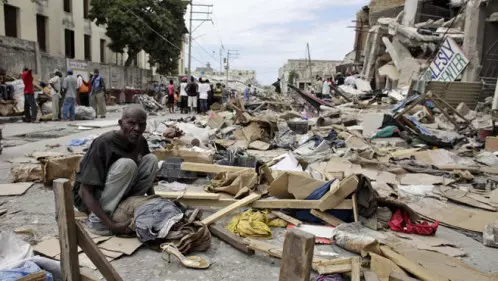
Humanitarian and Development
Place
Haiti
Sponsor
Thierry Vandevelde
Grant(s)
Study phase: €20,000 to the Selection Committee at 2012/06/05
Research phase and test phase: €60,000 to the Board of Administration at 2013/02/18
€100,000 to the Board of Administration at 2013/06/10
Project leader
In addition to the cholera eradication program that it runs in the Democratic Republic of Congo, the Veolia Foundation is active in many areas in several countries: in Haiti, in the countries bordering Lake Chad - Chad, Nigeria, Niger, North Cameroon - and in emergency areas as in Zimbabwe and South Sudan. Through this field expertise and its contacts with the various players involved in fighting cholera, the foundation has identified a need for tools allowing the rapid detection of cholera in water resources and an effective decision-making aid for field workers and funders (WHO, PAHO, UNICEF, ECHO, USAID, ACF, MSF). In fact, the decisions taken by humanitarian agencies in emergency situations are often based on the suspected presence of the bacteria, sometimes giving rise to programs that have a limited impact on the health of the population.
A tool for the rapid diagnosis of Vibriocholerae
Based on this finding, the Veolia Foundation has initiated a partnership with the Mérieux Foundation and the NGO Pharmaciens et Aide Humanitaire (PAH) aimed to develop a tool for a rapid diagnosis of Vibriocholerae, for every type of area affected by cholera, for rapidly detecting the presence of cholera in the water and effectively targeting the action required to protect the risk population and durably eradicate the disease. Once the tool is developed, it will be provided to all the players involved in fighting cholera via a nonprofit agency. The representatives of UNICEF, WHO, CDC, the European Union and the partner NGOs involved in cholera prevention programs have unanimously stressed the importance of the project.
An agreement has been signed by the Veolia and Mérieux foundations to finance:
- a 10-month research phase to develop a viable kit (kit optimization, performance tests, etc.);
- a two-month phase of field tests, in Haiti, in a laboratory of the Mérieux Group (Laboratoire Gheskio), alongside the National Public Health Research Laboratory (LNRSP) to validate the kit's performance.
The research project has also been presented to the members of the GAAC, securing the involvement of the research teams of Professor Rita Colwell of the University of Maryland to reinforce the research team on the subsequent development phases, and to start raising additional funds from American lenders.
Kit validation underway in Haiti
A first version of the kit designed to yield a result in 24 hours has been developed and validated on artificially contaminated resources in the bioMérieux laboratories in Lyon, France. A laboratory validation phase is underway in Haiti on naturally contaminated water, jointly with the Mérieux partner laboratories. At the same time, an advanced version of the kit is also under study jointly with Professor Colwell of the University of Maryland and Professor Whiteside of Harvard University. The many research objectives range from the ability to obtain a result on the same day as the sampling; the possibility of having a test with a specificity unrivaled on the market (detection of viable bacteria, whether cultivable or not); and the possibility of having a positive response on potential pathogenic non-01 non-O139 serogroups; as well as the potential variations of the advanced version to detect many other pathogens (shigella, E. coli, etc.).
Operational shortly: A quick kit for detecting cholera in drinking water
Once the kit is technically validated, the project will be supplemented by two additional phases: an industrialization phase and a marketing phase. These eligible expenditures for the humanitarian lenders will not be the subject of new funding by the project partners from equity.

